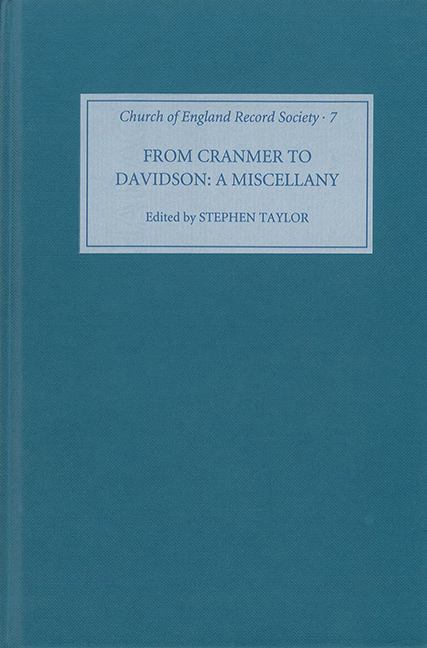Book contents
- Frontmatter
- Dedication
- Contents
- Preface
- Abbreviations
- 1 Thomas Cranmer and the Metropolitical Visitation of Canterbury Province 1533-1535
- 2 Edward Brocklesby: ‘The First Put Out of his Living for the Surplice’
- 3 Richard Montagu: ‘Concerning Recusancie of Communion with the Church of England’
- 4 Petitions for Episcopacy and the Book of Common Prayer on the Eve of the Civil war 1641-1642
- 5 Bishop Edmund Gibson's Proposals for Church Reform
- 6 Samuel Horsley: ‘Thoughts on Civil Government’
- 7 W. J. Conybeare: ‘Church Parties’
- 8 Randall Davidson: A Partial Retrospective
- Index
- Church of England Record Society: COUNCIL AND OFFICERS FOR THE YEAR 1998-99
2 - Edward Brocklesby: ‘The First Put Out of his Living for the Surplice’
Published online by Cambridge University Press: 14 August 2020
- Frontmatter
- Dedication
- Contents
- Preface
- Abbreviations
- 1 Thomas Cranmer and the Metropolitical Visitation of Canterbury Province 1533-1535
- 2 Edward Brocklesby: ‘The First Put Out of his Living for the Surplice’
- 3 Richard Montagu: ‘Concerning Recusancie of Communion with the Church of England’
- 4 Petitions for Episcopacy and the Book of Common Prayer on the Eve of the Civil war 1641-1642
- 5 Bishop Edmund Gibson's Proposals for Church Reform
- 6 Samuel Horsley: ‘Thoughts on Civil Government’
- 7 W. J. Conybeare: ‘Church Parties’
- 8 Randall Davidson: A Partial Retrospective
- Index
- Church of England Record Society: COUNCIL AND OFFICERS FOR THE YEAR 1998-99
Summary
Introduction
At the centre of the document here printed and edited stands a hitherto elusive, but historically important, Marian exile. He has long been known to historians as the proto-martyr of the nonconformist cause under Elizabeth I, in some way connected with the vestiarian controversy of 1564-6, but hitherto the precise manner and circumstances of his proto-martyrdom have remained obscure.
He was first mentioned in print by John Strype, quoting without acknowledgment from the diary of Thomas Earle, rector of St Mildred Bread Street (1564-1604): ‘Many … were sequestered, and afterwards some deposed and deprived. Among the rest, of the chiefest account were Dr Turner, Dean of Wells, … Mr Whithead, Mr Brackelsby, Mr Allen, and Mr Wyburn.’ Brocklesby's deprivation is mentioned in only one other contemporary source. The register of documents intended for publication in 1593 as a lengthy sequel to A parte of a register and eventually calendared by Dr Albert Peel contains ‘Depositions conceminge Mr Broklesby, the first put out of his liveinge for the surplice. 3 April Anno 1565.’ There follow the names of six deponents and their answers to eight articles, in four of which Brocklesby is referred to as ‘the Vicar'. Dr Peel rightly divined that this was all that now remained of a lost hearing before the ecclesiasticl commissioners but beyond that it seemed impossible to go. No later historian was able to recover Brocklesby's christian name or throw light on the two most baffling aspects of his case: the exceptionally early date - almost exactly a year before Archbishop Parker moved against the nonconformist London clergy in March 1566 - and the fact that no-one of the name of Brocklesby was known to have been beneficed in London at this time. The assumption has always been that the vestiarian controversy moved directly from Oxford to London, that in March 1566 Parker was using the city clergy as a test case, and that he only afterwards (and with minimal success) demanded that conformity be enforced elsewhere. Where, then, did Mr Brocklesby fit in?
The present document provides a partial, if surprising, answer. Edward Brocklesby proves to have been vicar of Hemel Hempstead, Hertfordshire, then within the archdeaconry of Huntingdon in the sprawling diocese of Lincoln.
- Type
- Chapter
- Information
- From Cranmer to DavidsonA Church of England Miscellany, pp. 47 - 68Publisher: Boydell & BrewerPrint publication year: 1999



